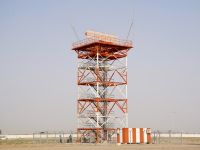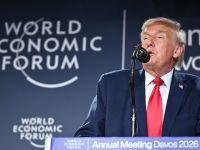Two months to the day since the Aug. 4 port blast ravaged almost half of Beirut, cycling icon Lance Armstrong rode Sunday through the capital’s streets in a push to keep Beirut's rehabilitation in the spotlight.
“It’s surreal, I’ve never seen anything like this,” he said at the port, surrounded by a group of around 40 lycra-clad biking enthusiasts. “In the US media now, it’s all elections and Covid. Hopefully this will do something, because it’s getting lost in all that other noise.”
In addition to trying to keep Beirut’s rehabilitation on the international agenda, the “Bike for Beirut” charity ride also supported four local NGOs active in the capital’s reconstruction following the port blast. More than 190 people died in the explosion, at least 6,500 more were injured and hundreds of thousands were left homeless.
With riders putting forward a not-insubstantial minimum donation of $300 to participate in the ride, funds collected will be split four ways between charities Beit El Baraka, Offre Joi, Heartbeat and the Lebanese Red Cross.
“We have a reconstruction project to get businesses back on their feet and people back in their homes before the rain,” said Alicia Nader, who coordinates an initiative with Beit EL Baraka targeting 3,011 households and 200 businesses.
“We’re going to need a lot of funding [but the danger is that] people are going to get bored at some point, the international community is going to forget and it’s not going to be on the front pages anymore,” she added.
Nader’s fears of donor fatigue are well founded, particularly when the upper estimates of losses caused by the blast reach a crippling $8.1 billion, according to World Bank calculations.
Just 20.1 percent of the UN’s $354.9 milllion flash appeal for Beirut has so far been disbursed, according to the UN’s Financial Tracking Service. Cabinet’s Donor Coordination Platform also shows that $44 million has been donated directly to governmental institutions in their response to the blast, mostly through in-kind contributions.
The bulk of the reconstruction and rehabilitation assistance to Lebanon is expected to come after a new government is formed.
French President Emmanuel Macron, who in August organized an international conference that raised nearly $300 million for humanitarian relief to Beirut, has pledged to host a second donor conference once the new government makes credible progress on carrying out a slew of long-overdue reforms.
Progress on that front is, however, non-existent. Fifty-five days after outgoing Prime Minister Hassan Diab resigned over the blast, politicians are still arguing over the number of ministers in the incoming Cabinet, the portfolios they take and whether political blocs or the yet-to-be appointed prime-minister designate should name them.
“Clearly there’s a high level of frustration among the people who live here full time,” Armstrong said of the governmental deadlock and lack of political leadership. “With time, people get impatient and frustrated. If they can be organized then hopefully it’ll take less time.”
Until then, personal initiatives may have to help fill the gap left by the inaction and incompetence of the political class in the face of the blast, which has exacerbated Lebanon’s worst ever financial crisis and the effects of the COVID-19 pandemic.
“What happened in Beirut touched everybody who saw it worldwide, and each one of us I think tried in their own way to see what they could do to help,” event co-organizer Ziad Ghandour told The Daily Star.
“There are a lot of good NGOs, but the [selection] criteria was that they were non-political, with no kind of affiliation whatsoever, and also who’s on the ground trying to do the most,” the Los Angeles based organizer added.
For participant Tony Massabneh, whose home was gutted in the blast, these kind of initiatives have become “a duty,” helping to create a safety net for the more than 50 percent of Lebanese who now live under the poverty line.
“Whatever you can do to help anyone in Lebanon is extremely useful and helpful these days. It’s a duty really,” he said.
Armstrong, who became a household name during his professional career, fought cancer, and was later found to have used performance-enhancing drugs, agreed.
“I know what it’s like to have your back against the wall, so I can relate,” he said of the massive challenges facing Lebanon.
This article has been adapted from its original source.








